After enjoying another Marine Corps Marathon (47th place in 2:49 age 48) curiosity led to digging into past races that stretch back several decades. So into the archives I plunged to see how many MCMs (I thought it was 22) and what the times were. So I contacted my friend and Marine Corps Marathon historian George Banker (himself a 31-time MCM finisher, a member of the MCM Hall of Fame, and author of the book “History of the Marine Corps Marathon”). At one time George had sent me a picture of his basement which was filled with old newspapers, magazines, and photos of running history.
I am grateful to people like George who save things. I have moved too many times in my career to gather things. Not only had George gathered this data, but he had data on one of my other favorite races, the Air Force Marathon. I added my favorite spring race- the Boston Marathon. These three marathons have special meaning for me as a career military officer and representative of the US Air Force competing in these races. Here are the times over the years, and then commentary afterwards. Medical School, Residency in California, overseas assignments, and no disposable income led to some early holes.
Marine Corps Marathon (October)
Date Age Time
1988 22 2:34:02
1989 23 2:32:41
1990 24 2:31:52
1992 26 2:36:35
1994 28 2:31:01
1995 29 alternate fall race- World Military Championships Rome 2:24 10th
1996 30 2:27:20 4th place overall
1997* 31 2:35:21
1998 32 alternate fall race- Air Force Marathon 2:34
1999 33 alternate fall race- Chicago Marathon 2:24 49th place
Spring 2000-Bilateral Foot Surgery– Time to Relearn How to Run
2000 34 2:28:55 3rd Place overall
2001 35 alternate fall race- US Marathon Champs@NYC Marathon 2:33, 67th & 33rd US
2002 36 2:34:46
2003 37 2:33:37
2004 38 2:39:41
2005 39 2:34:47
2006* 40 2:32:45 1st Master
2007* 41 2:37:48
2008* 42 2:34:48 1st Master
2009* 43 2:40:55
2010* 44 2:42:07
2011* 45 2:43:47
2012* 46 2:48:29 1st 45-49
2013* 47 2:47:35
2014* 48 2:49:49
Average time 2:38 21 Starts/Finishes
*Double Air Force Marathon and Marine Corps Marathon
Air Force Marathon (September)
1997(inaugural yr)2:32 2nd
1998 2:34 3rd
2006 2:31:46 1st Overall Age 39
2007 2:34 5th
2008 2:39 6th
2009 2:44:49 1ST Master & 4th
2010 2:42:02 5th
2011 2:38:48 1st Overall Age 44
2012 2:42:07 10th
2013 2:51:13 12th
2014 2:51:37 11th
Average time 2:40 11 Starts/Finishes
Boston Marathon (April)
1989 22 DNF (clueless about running downhills; ran first half 1:08)
1990 23 2:56 (still figuring out how to run downhill)
1991 24 2:30:26 (figured it out!)
1993 26 2:31:10
1995 28 2:29:30
1997 30 2:27:20
Spring 2000-Bilateral Foot Surgery– Time to Relearn How to Run
2001 34 2:29:12
2002 35 2:29:56
2003 36 2:44:38
2004 37 2:44:29
2005 38 2:37:22
2006 39 2:31:42
2007 40 2:41:15
2008 41 2:34:49
2009 42 2:37:04
2010 43 2:34:21
2011 44 2:37:00
2012 45 2:46:49
2013 46 2:42:54
2014 47 2:48:59
Average time 2:36 20 Starts/19 Finishes
***
Looking back at these three marathons has given me a new perspective on running. In today’s culture there is a trend and emphasis on high-intensity training as the path to success. I agree that for immediate performance this is true, but the jury is out if we are talking about long-term health and balance if one has a busy life. There are also lots of folks who read stuff, write stuff, make claims as to what is true based on short term results, but do not actually run or are former runners.
In the results, I have 19 Boston and 21 Marine Corps finishes and 11 Air Force finishes with the only ones above 2:50 being my second Boston when I had not figured out how to run downhills for 26 miles and the two most recent Air Force Marathons in 2:51, but recovered quickly to run under 2:50 in the Marine Corps race a few weeks later.
The late Dr. George Sheehan often wrote “we are all an experiment of one”. This is true, but I think one must understand the principles of overall health and how to treat your body to keep the experiment going. Since my foot surgeries in 2000, I have not done any training which would be considered “hard” or “anaerobic” by modern extreme fitness zealots. Most proponents of “pain is gain” cannot produce this type of sustainable performance data in themselves or any of their clients or athletes. I have not missed a Boston or Marine Corps since 2000 (and have not had running related injury since then either) and despite some years of extreme weather at these races the times are all consistent with the gentle physiologic age related decline.
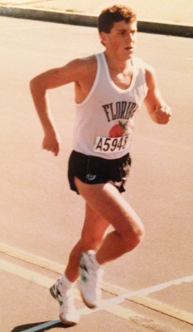 Here is a photo of my first Marine Corps Marathon in 1988. I was in my first year of medical school and had taken the summer off of running after four years of college running and the toll it had taken on my body. I also lived in LA that summer and tried to run one day and the air so bad my lungs actually hurt.
Here is a photo of my first Marine Corps Marathon in 1988. I was in my first year of medical school and had taken the summer off of running after four years of college running and the toll it had taken on my body. I also lived in LA that summer and tried to run one day and the air so bad my lungs actually hurt.
I quickly put on 20 pounds as I did not change my diet from the “runners diet” of low fat and high carbs (notice a bit bulkier body). On return to medical school I again found the joy in running for stress relief and to allow me to concentrate better in studies. Two weeks before the race I joined a friend for a long run and ended up running about 16 miles. He convinced me to line up with him in D.C, two weeks later where I finished in 2:34 in my minimal Nike Duelists. I was hooked.
Unfortunately I wore these same shoes in Boston the following spring to fly down the hills in the first half of the race (1:08 split) but my quads were mashed potatoes by Boston College. So took the T home for one of only two marathon DNFs. Learned that lesson! (the other DNF in NYC in 1991 when I lined up with severe plantar fasciitis). I wore an old Florida Track Club singlet given to me by my Loyola High School Phil Kirby since I did not feel like I had returned to fitness as a runner worthy of representing my University or the US Air Force.
This next finish photo is two years later when I was chasing my first sub 2:30. In those years, the Marine Corps Race finished on top of Iwo Jima and my sub 2:30 evaporated with the Hains Point winds (miles 20-23 used to be there) and the steep last half mile climb and finished in 2:31. I again felt like a runner and wore my college colors (University of Virginia) and even the painters cap with the bill flipped up in homage to Dick Beardsley who ran Alberto Salazar to the line at Boston the year prior.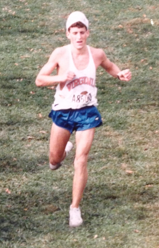
It’s 2014, and I now run for joy and comradery with fellow Armed Forces runners. One runner who keeps me honest every year is former Marine Alex Hetherington who also has 21 finishes and I believe all under 2:50 . This year we ran together much of the race, but he was stronger the last 2 miles and finished in 2:48 to my 2:49. Well done Alex! I’ll be back. See you at JFK 50 in 3 weeks.
Below is a picture of our annual Mall run the day before the race where we all think about and honor our fallen fellow service members. We started this tradition in honor of our teammate MSGT Michael Mann who passed from lung cancer in 2007 and ran his last Marine Corps Marathon in 2004. His courage and love of running allowed him to outlive his prognosis by 2 years, and he spent every day of those two years living. Read his story here.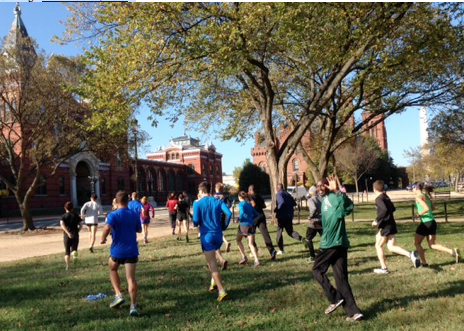
Me after this year’s Marine Corps Marathon…
So what is the “secret sauce” of long-term healthy running? Let NRC readers know how you do it as well!
- Run for joy
- Recover
- Do not run too hard; finish each run as if you could do it again
- Keep “fast and agile” with short sprints and drills
- Keep mobile, esp in the ankles and hips. Play with these drills.
- Keep your foundation strong–this is your foot. Wear flat shoes shaped like your foot to stand, walk, run, and play. Go barefoot as often as you can at home.
- Learn the skill of running and keep trying to master this. A tool like TrueForm motorless treadmill helps
- Do simple strength training with Kettle Bells and Burpees
- Be your own body sensor and coach
- Don’t sit
- Eat real food
- Do not put pain into your body
- And pass it forward…we all continue to learn by teaching and sharing with others and seeing the response. Attend a Healthy Running Course with us!

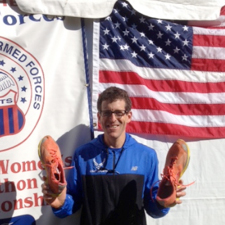
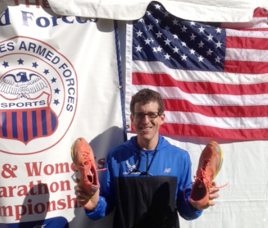
Have you run marathons barefoot? If so what kind of times?
Paul have not run full barefoot but have done shorter races for fun in barefeet. mix barefoot into my training to keep balanced, strong in the feet, and recover. To RACE a marathon on urban streets a light responsive shoe is an asset. maybe this winter will find a nice barefoot friendly marathon as trainer for Comradres 2015. Mark
Thanks for sharing, Mark!
It is unbelievable how many runners and coaches believe that the key to success in the marathon is hard mile repeats, high weekly miles, and long hard tempo runs.
I felt prey to this; and most often, the results didn’t stack up and I was injured or chronically fatigued. In fact and to my surprise, my marathon times improved when I didn’t merely jam miles in the week or do “hard” training.
I love hearing about your perspectives on training and all other facets running. Thanks!
Thanks Chad…it is not too late to reset and keep going. Mark
Great Post Dr. Mark! What a concept, listen to your body and don’t train to utter exhaustion. I just read the most succinct phrase about training by David Weinstock, “don’t exercise beyond the limit of your brain’s ability to control a movement properly.”
Thanks Steve for the note. great quote…or “don’t train to failure” Mark
Great words, Mark. You are an example of longevity in action and an inspiration for running as part of a healthy lifestyle. Thanks for keeping it fun! “Play is where life lives.”
Thanks Doug….i’ll keep chasing you in the races. You are setting the example too for Military Service Members. Mark
Mark,
It is nice to hear this perspective from a military doctor. I am Active Duty Air Force and I am sad to say that the CrossFit crowd is taking over. I am 38 and I am consistently faster than the 18-22 year/olds that are coming in. My weekly fitness is usually running 40-50 miles a week at a very relaxed pace and then various other exercises to maintain core and upper body strength. We really need to high level command sponsorship to address the high intensity fad. I admit they produce quick results but they are not sustainable and nearly always lead to injuries. Thanks for the article. By the way I found your site from the link you posted on RunnersWorld.com
Thanks Jeremy…you get it! Mark
Great tips
I really seem to devour everything written on this website and just want to thank you for the profound simplicity in all your running analysis
I am a 58 yr old New Zealander and have got faster each year since embracing natural running form around three years ago
Loving each run
Pete Howcroft
thanks Pete…want to visit NZ. I am a big fan of Lydiard and many friends from your country. Mark